Main Page
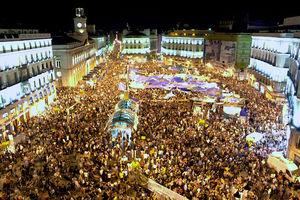
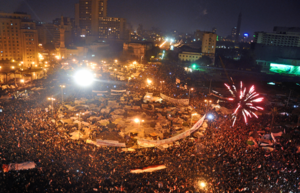
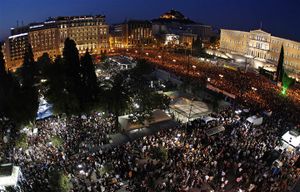
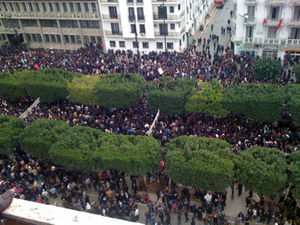
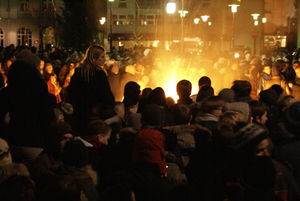
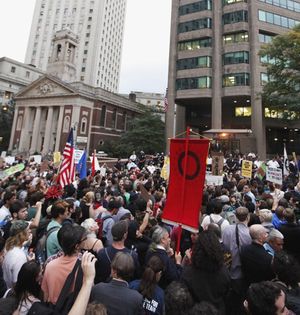
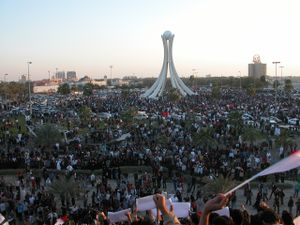
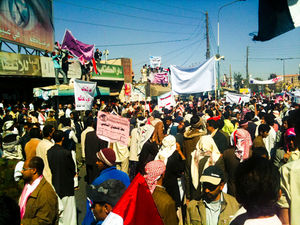
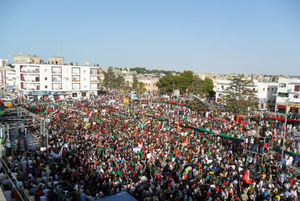
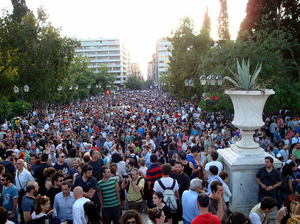
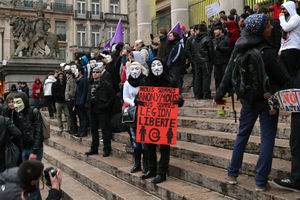
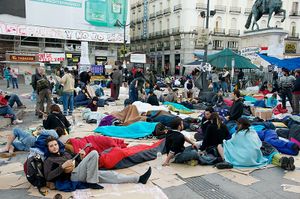
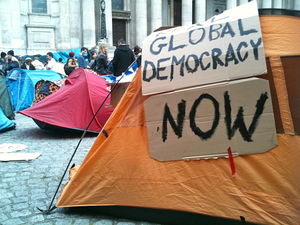
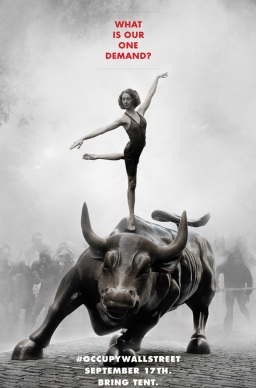
Workshop: Understanding the New Wave of Social Cooperation: A Triangulation of the Arab Revolutions, European Mobilizations and the American Occupy Movement
9:00am-5:15pm
March 21st, 2012
Harvard University- Cambridge, MA (Boston)
Social media hashtag: #21M
Introduction
This one-day workshop brings together several groups of researchers: members of the Council for European Studies (CES) European Social Movements research network who will be in Boston for the Council for European Studies conference (March 22 - 24); scholars at the Berkman Center; and researchers from institutions including the Harvard Kennedy School, MIT's Comparative Media Center, Northwest University and Boston College's Social Movements seminar.
The workshop will be hosted in the Berkman Center at Harvard University and is organized in cooperation with the Council for European Studies (CES) European Social Movements research network and other Boston-based groups working in this space.
Goals and Key Objectives
At this event, we will undertake a historically grounded comparative approach that attempts to place these protests and their corresponding forms of social cooperation in context and seeks to establish an analytical and theoretical grounding for the study of these events. We plan not only to investigate each individual case, but also to assess the relationships (or lack thereof) between each of the respective cases.
More specifically, the workshop aims to analyze the particular details associated with each national/regional case and will endeavor to identify and discuss any commonalities between them based on a 'triangulation' of current research and understanding on the Arab revolutions, European mobilizations and the American Occupy movement. To facilitate an interactive discussion on these topics during the event, the specific angle of each of the three planned sessions was defined around clusters of participants' interest:
- EMERGING ORGANIZATIONAL FORMS AND DIGITAL TECHNOLOGIES
Which organizational forms were adopted by the movements in each case? What is the role of social media in shaping these emerging forms? Are there similarities among the cases? What do these cases tell us about the conditions and organizational principles of collective action?
- WHO MOBILIZED AND WITH WHICH GOALS AND STRATEGIES?
What is the movement composition (i.e, who were the actors and what social bases were involved)? In terms of the actors what is the continuity with previous mobilization waves, such as the global justice movement? What were/are the visions and strategies of change in each of the cases? Is there a common political view or strategy among all the cases? What are the significant divisions between actors within each individual case? Are there similar divisions across different cases, and to what extent are the local and national dynamics important in shaping movement configuration?
- EXPLANATORY FACTORS AND CONNECTIONS AMONG THE CASES
Why did social mobilization happen in so many countries at once? Are there similar explanatory factors and historical trajectories that explain why mobilization took place? Is it legitimate to talk about a global wave of mobilization? If so, how are these different cases connected and how might we confirm and document the connections between movements? What are the mechanisms of diffusion and translation among the cases?
Objectives:
To achieve the overarching goal of "triangulating" of the current research and understanding on the Arab revolutions, European mobilizations and the American Occupy movement, we aim to:
- Contextualize (both historically and from a socio-political perspective) the impact of digital tools in collective action by connecting the social movements studies tradition with the analysis of Internet-based phenomena, which will require drawing connections among European, North American, and Arabic approaches to research and analysis.
- Map and systematically organize existing research and expertise on the current wave of social cooperation and mobilization.
- Exchange, share, and discuss current work and facilitate synergy among researchers on the topic.
Format and methodology
The workshop is intended as an exchange between researchers at the event rather than as an opportunity to disseminate information to other researchers or to the general public. To facilitate interaction among researchers, this workshop will avoid conference-style presentations and instead is designed to foster dialogue among individuals working in this space. The format will be mainly discussion-based around a series of questions, with the opportunity to share papers in advance of the event itself at this wiki. A maximum of 30 participants are expected at this highly-interactive event.
For each session, a moderator will introduce the theme followed by very short (5 minute) warm up presentations. Then all participants will be invited to discuss any and all issues pertaining to the theme. Each session will finalized by someone providing a synthesis of the discussion. For each session, we will assign a note taker and like tweeting.
Please note that all workshop discussion will be audio recorded for note taking purposes. Live streaming connexion could be provided upon request (contact: mayo.fuster(at)eui.eu).
Schedule
20 March
8:00 pm: (Optional) Informal dinner among the participants in town (particularly those coming from abroad)
http://acetarium.com/ (265 Elm Street, Somerville T Station: Davis Square) – Please add your name to list of people attending the dinner if you plan to attend
21 March
9:00 am Welcome and introduction Room 105 in Hauser Hall
Coffee and baked goods will be provided
Lighting Round Introductions (30 seconds each) (15 minutes)
9:30 am – 10:30 am EMERGING ORGANIZATIONAL FORMS AND DIGITAL TECHNOLOGIES Room 105 in Hauser Hall
Which organizational forms were adopted by the movements in each case? What is the role of social media in shaping these emerging forms? Are there similarities among the cases? What do these cases tell us about the conditions and organizational principles of collective action?
- Three short warm up presentation (5-7 min, each) on Egypt, Spain and OWS cases.
- General discussion: Participants working on the area from a more “digital” perspective: Mayo Fuster Morell, Sasha Costanza-Chock, Rob Faris, Bruce Etling, Nagla Rizk, Alice Mattoni, Colin Maclay, Pablo Rey, Lina Attalah, Jeffrey Juris, Jason Pramas, Beth Coleman, Alicia Solow-Niederman, Dalida María Benfield More on each participant's approach to the topic.
10:30 am-10:45 am Coffee Break
10:45 am-11:45 am CONTINUATION EMERGING ORGANIZATIONAL FORMS AND DIGITAL TECHNOLOGIES: METHODOLOGICAL APPROACHES Room 105 in Hauser Hall
- Two short warm up presentation (5-7 min each): Social Network analysis, text analysis, blogs, Twitter and MSM; and Occupy research experience.
- General discussion
- Ending morning Session Synthesis (5 - 7 minutes).
11:45 am-1:00 pm Lunch and move to new location
We will take lunch and then walk as a group to the Berkman Center, 23 Everett St., 2nd floor
Group picture at the Berkman Center entrance.
1:00 pm-2:30 pm: WHO MOBILIZED AND WITH WHICH GOALS AND STRATEGIES? Berkman Center Conference Room, 23 Everett Street, 2nd Floor
What is the movement composition (i.e, who were the actors and what social bases were involved)? In terms of the actors what is the continuity with previous mobilization waves, such as the global justice movement? What were/are the visions and strategies of change in each of the cases? Is there a common political view or strategy among all the cases? What are the significant divisions between actors within each individual case? Are there similar divisions across different cases, and to what extent are the local and national dynamics important in shaping movement configuration?
- Three short warm up presentation Egypt and Tunisia; Europe and Greece; and OWS cases (5-7 min, each)
- General Discussion: Participants with a particular focus on this area: Francis Dupuis-Déri, Ofer Sharone, E. Coling Roggero, Maite Tapia, and Marcos Ancelovici More on each participant's approach to the topic
- Ending morning Session Synthesis (5 - 7 minutes).
2:30 pm-2:45 pm Coffee break
2:45 pm-4:15 pm: EXPLANATORY FACTORS AND CONNECTIONS AMONG THE CASES Berkman Center Conference Room, 23 Everett Street, 2nd Floor
Why did social mobilization happen in so many countries at once? Are there similar explanatory factors and historical trajectories that explain why mobilization took place? Is it legitimate to talk about a global wave of mobilization? If so, how are these different cases connected and how might we confirm and document the connections between movements? What are the mechanisms of diffusion and translation among the cases?
- Three Warm up presentation Egypt and Tunisia contrast; Israel, Arab countries & Occupy comparison; and historical waves of mobilization (5-7 min, each)
- General Discussion: Participants with a particular focus on this area: Jeffrey Juris, Jason Pramas, Maria Kousis, Nicole Doerr, Cristina Flesher Fominaya, Robert J. Wengronowitz, and Laurence Cox. More on each participant's approach to the topic
- Ending morning Session Synthesis (5 - 7 minutes).
4:15 pm - 5:00 pm Final reflections and next steps: “Theoretical Take-Aways and Ways to Rethink Research” Berkman Center Conference Room, 23 Everett Street, 2nd Floor
Addressing main or traversal questions that emerged during the day.
Brainstorming of takes from the workshop (Each says one or two takes) - Topics: Methods, Theory, and Comparability of the cases
Closing Remarks
6:00 pm Dinner (Optional) at Henrietta's Table (Please add your name to List of people attending the dinner if you plan to attend)
(Please note that participants will pay on own for this meal and that we'll be ordering off of the 2012 Restaurant Week $33 prix fixe menu, which is cash only)
Post – workshop: Optional activities
22 March and 23 March (Optional)
Seminars and workshop Council of European Studies Conference
23 March and 24 March (Optional)
OccupyData Hackathon 2: Data Visualization for the 99%!
What: OccupyData Hackathon 1 brought you visualizations of 13 million occupy tweets (see summaries by OccupyResearch, R-Shief, Fast Company, and Utrecht University). People participated from Utrech, LA, Boston, NY, and Spain.OccupyData Hackathon 2 builds on the demos and tools from the first round, and turns our collaborative energy on visualizing the 5000+ responses to the OccupyResearch General Demographics and Participation Survey (ORGS), R-Shief Twitter #occupy tags aggregated since September 2011, and Occupy Oakland Serves the People survey, as well as other datasets people might want to explore. This event is not only for hackers or coders, but for anyone who’s interested. Bring your ideas, skills, creativity, questions and critical perspectives as we explore occupy datasets using free and open source tools and software. We’ll make connections from one place to another – open to all participants! The model is for people to arrange local venues for f2f meetups, work locally, and share/collaborate real time via skype/chat/twitter/google docs and etherpads, etc. If you can’t make it to one of the physical locations, you can still join in remotely.
How: Sign up here
Where in Cambridge: MIT Media Lab E15-432, 20 Ames Street Cambridge, MA 02139 USA (http://www.media.mit.edu/about/building) Contacts for clarification on location and others: Sasha Costanza-Chock (schock(at)MIT.EDU) & Pablo Rey (Pablo(at)basurama.org) or irc.lc.freenode/occupydata
Participants
This small (limited to 30 individuals), invitation-only workshop will include a diverse range of researchers focusing on the Arab Spring, European wave, or Occupy movements. We have endeavored to include an array of individuals who approach the topic from both action and research perspectives.
Workshop ecosystem: The workshop will create the opportunity for discussion among researchers with very diverse profiles and trajectories; specifically, participants will come to the table with, among other attributes, a combination of European, Arabic and United States profiles; English-native and non-English-native backgrounds; varying degrees of experience with social movements scholarship (from experts to fairly unfamiliar with this literature); and both digital and non-digital emphases. We see such diversity as a feature rather than a bug; still, to create a respectful and productive environment for discussion, we ask that participants approach the event with an open mind as well as a willingness to take distance from each position and to explain any salient details (e.g., related to linguistic differences, historical approaches, or different research modes) with which they may be familiar, yet of which other participants may be less aware.
Map of case/participant
USA Occupy movement (general): Beth Coleman, Maite Tapia, E. Colin Ruggero, Marcos Ancelovici, William A. (Bill) Gamson, Ofer Sharone, Pablo Rey, Dalida María Benfield, Nicole Doerr
- Boston: Sasha Costanza-Chock, Pablo Rey, Nicole Doerr, Jeffrey Juris, Jason Pramas, Sandra Ray, Robert J. Wengronowitz
- Pittburg: Alice Mattoni
- Philadelphia: E. Colin Ruggero
Canada: Montreal: Marcos Ancelovici
Arab Spring (general): Rob Faris, Bruce Etling, Alicia Solow-Niederman, William A. (Bill) Gamson
- Tunisia: Zack Brisson
- Egypt: Lina Attalah, Zeynep Tufekci, Nagla Rizk, Alicia Solow-Niederman, Zack Brisson, Dalida María Benfield
South African Movements: Nicole Doerr
Israeli Summer: William A. (Bill) Gamson
European dimension: Christian Scholl, Cristina María Flesher Fominaya, Francesca Vassallo, Nicole Doerr
- Spain: Mayo Fuster Morell, Pablo Rey, Cristina María Flesher Fominaya, Marcos Ancelovici
- Germany: Nicole Doerr, Maite Tapia
- Greece: Maria Kousis, Sandra Ray
- Italy: Alice Mattoni
- UK: Maite Tapia
- Ireland: Laurence Cox France : Marcos Ancelovici, Francesca Vassallo
- Amsterdam: Christian Scholl
- Poland: Elzbieta Cizewska
- France: Marcos Ancelovici
- Russia: Rob Faris, Bruce Etling
Distribution of participants per topics
Bibliographic resources
Please add any relevant resource.
Arab Spring
Brisson, Zack, & Krontiris, Kate (March, 2012). 'Tunisia: From Revolutions to Institutions' <http://dl.dropbox.com/u/53226669/Tunisia%201-2012-Publication-Web-%C6%92.pdf> World Bank Group
Brisson, Zack, & Lee, Panthea (March, 2011). 'Egypt: From Revolutions to Institutions'<http://thereboot.org/wp-content/Egypt/Reboot-Egypt-From-Revolutions-To-Institutions.pdf>
Nepstad, Sharon Erickson (2012) Nonviolent Resistance in the Arab Spring: The Critical Role of Military-Opposition Alliances. Swiss Political Science Review. Special issue:http://dmmsclick.wiley.com/view.asp?m=0jcva5g0090vlet42smd&u=19087420&f=h
Goodwin, Jeff. (2012) Why We Were Surprised (Again) by the Arab Spring. Swiss Political Science Review. Special issue: http://dmmsclick.wiley.com/view.asp?m=0jcva5g0090vlet42smd&u=19087420&f=h
Schneider, Cathy Lisa (2012) Violence and State Repression.Swiss Political Science Review. Special issue: http://dmmsclick.wiley.com/view.asp?m=0jcva5g0090vlet42smd&u=19087420&f=h
Alimi, Eitan Y. and David S. Meyer (2012) Seasons of Change: Arab Spring and Political Opportunities. Swiss Political Science Review. Special issue: http://dmmsclick.wiley.com/view.asp?m=0jcva5g0090vlet42smd&u=19087420&f=h
Diani, Mario (2012) Networks and Internet into Perspective. Swiss Political Science Review. Special issue: http://dmmsclick.wiley.com/view.asp?m=0jcva5g0090vlet42smd&u=19087420&f=h
Gamson, William A. (2012) Arab Spring, Israeli Summer, and the Process of Cognitive Liberation. Swiss Political Science Review. Special issue: http://dmmsclick.wiley.com/view.asp?m=0jcva5g0090vlet42smd&u=19087420&f=h
Goldstone, Jack A. (2012) Cross-class Coalitions and the Making of the Arab Revolts of 2011. Swiss Political Science Review. Special issue: http://dmmsclick.wiley.com/view.asp?m=0jcva5g0090vlet42smd&u=19087420&f=h
Aouragh, Miriyam and Anne Alexander. 2011. “The Egyptian experience.” International Journal of Communication (5): 1344-1358. International Journal of Communication (Vol. 5), http://ijoc.org/ojs/index.php/ijoc
Lotan, Gilad et al. 2011. “The revolutions were tweeted.” International Journal of Communications 5: 1375-1405. Malcolm Gladwell’s blog post on The New Yorker website, “Does Egypt Need Twitter?” www.newyorker.com (accessed November 11, 2011).
Tufekci, Zaynep. 2011. “Too many messages and only one Facebook page.” Technosociology. Blog posted on September 19, 2011. http://technosociology.org, accessed November 11, 2011.
Tufekci, Zaynep. 2011. “New media and the people-powered uprisings.” Technology Review. Blog posted on August 30, 2011. www.technologyreview.com/blog/guest/27122/, accessed November 11, 2011.
Tufekci, Zeynep (2011) Video presentation http://cyber.law.harvard.edu/people/zeynep & http://technosociology.org/ Keywords/themes: Collective action and technology Focus cases: Arab Spring (Egypt) Related work: Video presentation: From Tehran to Tahrir: Social Media and Dynamics of Collective Action under Authoritarian Regimes http://cyber.law.harvard.edu/events/luncheon/2011/09/tufekci
Wilson, Christopher and Alexandra Dunn. 2011a. “Digital media in the Egyptian revolution.” International Journal of Communication 5: 1248-1272.
Spanish "Indignatos"/15M
Fuster Morell, M (2011) Video presentation: The Spanish Revolution & the Internet: From free culture to meta-politics http://cyber.law.harvard.edu/events/luncheon/2011/11/morell
Fuster Morell, M. & Subirats, J. (2012). Més enllà d'Internet com a eina "martell” - eina de la vella política: Cap un nou Policy Making?. Els casos del Moviment de Cultura Lliure i pel Procomú Digital i el 15M a Catalunya (Beyond the Internet as a tool "hammer" - tool of the old politics: Towards a New Policy Making?. Cases the Free Culture Movement and the digital commons and 15M in Catalonia). Research report. Institute de Govern i Politiques Publiques (UAB) per l'Escola d'Administracio Publica de Catalunya. (139 pages)
Postill, John. n.d. “Democracy in an age of viral reality,” unpublished manuscript submitted to special edition of Ethnography “Media Ethnography and Public Sphere Engagement,” edited by Debra Vidali and Thomas Tufte.
Taibo, Carlos. 2011. El 15-M en sesenta preguntas. Madrid: Los libros de la Catarata.
Occupy Wall Street
Adbusters call to occupy wall street: www.adbusters.org/blogs/adbusters-blog/occupywallstreet.html (accessed October 24, 2011).
Collins, Joan. 2012. "Theorizing Wisconsin's 2011 Protests." American Ethnologist 39(1): 1-15.
Collins, Randall. 2001. “Social movements and the focus of emotional attention.” In Passionate Politics, edited by Jeff Goodwin, James M. Jasper and Francesca Polletta, 27–44. Chicago, IL: The University of Chicago Press.
Hector R. Cordero-Guzman, "Main Stream Support for a Mainstream Movement, The 99% Movement Comes From and Looks Like the 99%, Profile of web traffic taken from occupywallstreet.org," October 19, 2011, http://occupywallst.org (accessed January 4, 2011).
Graeber, David. 2011. "On Playing By the Rules—The Strange Success of #OccupyWallStreet,"http://www.nakedcapitalism.com (accessed January 4, 2012).
Hardt, Michael and Antonio Negro. 2011. "The Fight for 'Real Democracy' at the Heart of Occupy Wall Street." - (October 11), www.foreignaffairs.com (accessed January 5, 2012).
Milan, Stefania. 2011. “Cloud protesting.” Blog posted on October 18, 2011. http://stefi.engagetv.com/node/103, accessed November 11, 2011.
Gamson, Bill. (2012) Cultural Outcomes of the Occupy Movement. December 30, 2011 [with changes added: January 2, 2012]
Rinke, Einke M. and Maria Röder. 2011. “Media ecologies, communication culture, and temporal-spatial unfolding.” International Journal of Communication 5: 1273-1285.
Schradie, Jen. 2011. "Why Tents (Still) Matter for the Occupy Movement," www.commondreams.org (January 4, 2012).
Suresh, Fernando Occupy Vancouver Organizer on Dec 27, 2011Occupy My Soul by http://thenextedge.org/2011/12/occupy-my-soul/
Ruggero, E, Colin (2011). "Spirit of ’76: Occupy Philadelphia, Voicelessness, and the Challenge of Growing the Occupy Wall Street Movement" Deliberately Considered, November 2011. Blog post: [1]
Gamson, Bill. (2012) Boston College Cultural Outcomes of the Occupy Movement. December 30, 2011 [with changes added: January 2, 2012]
Blogs on OWS:
Meyer David's Blog: http://politicsoutdoors.com/tag/occupy/ and http://politicsoutdoors.com/tag/occupy-wall-street/;
The Center for the Study of Social Movements at the University of Notre Dame <http://cssm.nd.edu/>: http://mobilizingideas.wordpress.com/tag/occupy-movement/;
Foreign Affairs articles on OWS: http://www.foreignaffairs.com/node/133733.
Comparison of several cases
Ancelovici, Marcos (2012) “Le mouvement Occupy et la question des inégalités: Ce que le slogan ‘Nous sommes les 99 %’ dit et ne dit pas.” In F. Dupuis-Déri, ed. Par dessus le marché! Rélexions critiques sur le capitalisme. Montreal: Écosociété. [2]
Rey, Pablo (2011) Gallery of different twitter-newspaper visualizations. http://numeroteca.org/cat/frontpage-newspaper/
Rey, Pablo (2011) Post: Analyzing newspapers’ front pages to interpret the Mainstream Media ecology. Researching the #15M, #Occupy movement and the Arab Spring. Interested in the relationship between Mainstream Media and social Media(Twitter): http://civic.mit.edu/blog/pablo/analyzing-newspapers-front-pages
Gamson, William A. (2012) Arab Spring, Israeli Summer, and the Process of Cognitive Liberation. Swiss Political Science Review. Special issue: http://dmmsclick.wiley.com/view.asp?m=0jcva5g0090vlet42smd&u=19087420&f=h
USA - SPAIN
Fuster Morell, M (2012) Blog post Report on OWS Forum on the commons: http://www.onlinecreation.info/?p=492
Others
Bauwens, Michel 'Occupy' as a business model: The emerging open-source civilisation. The Occupy Wall Street movement is a model for a new economic paradigm, in which value is first created by communities. http://www.aljazeera.com/indepth/opinion/2012/03/2012361233474499.html
Observatorio Metropolitano (Octubre 2011). Crisis y revolucion en Europa. Traficantes de suenyos: Madrid. (Spanish) http://traficantes.net/index.php/editorial/catalogo/otras/Crisis-y-revolucion-en-Europa This analysis by Observatorio Metropolitano (October 2011) links the social mobilizaions from northern Africa and Europe.
Occupy research resources:
Locations & how to get there
Location: The workshop is taking place in two places
A Morning Session from '9:00am-1:00pm - Room 105 in Hauser Hall, Harvard Law School
After the lunch break, from 1:00pm-5:15pm- The Berkman Center for Internet & Society at 23 Everett Street, second floor
Link to map of directions from Harvard T station (underground station)
Getting there:
- Driving Directions: http://www.law.harvard.edu/about/contact/directions.php#Driving
- Subway Directions: http://www.law.harvard.edu/about/contact/directions.php#Subway
- Bus Directions: http://www.law.harvard.edu/about/contact/directions.php#Bus
- Parking is not available through Harvard Law School, but there are several parking garages in Harvard Square
- Wireless Internet access will be available at the workshop
- Social Media Participation: Twitter / Identica hashtag: #21M
- Other questions? Contact Amar Ashar at ashar(at)cyber.law.harvard.edu